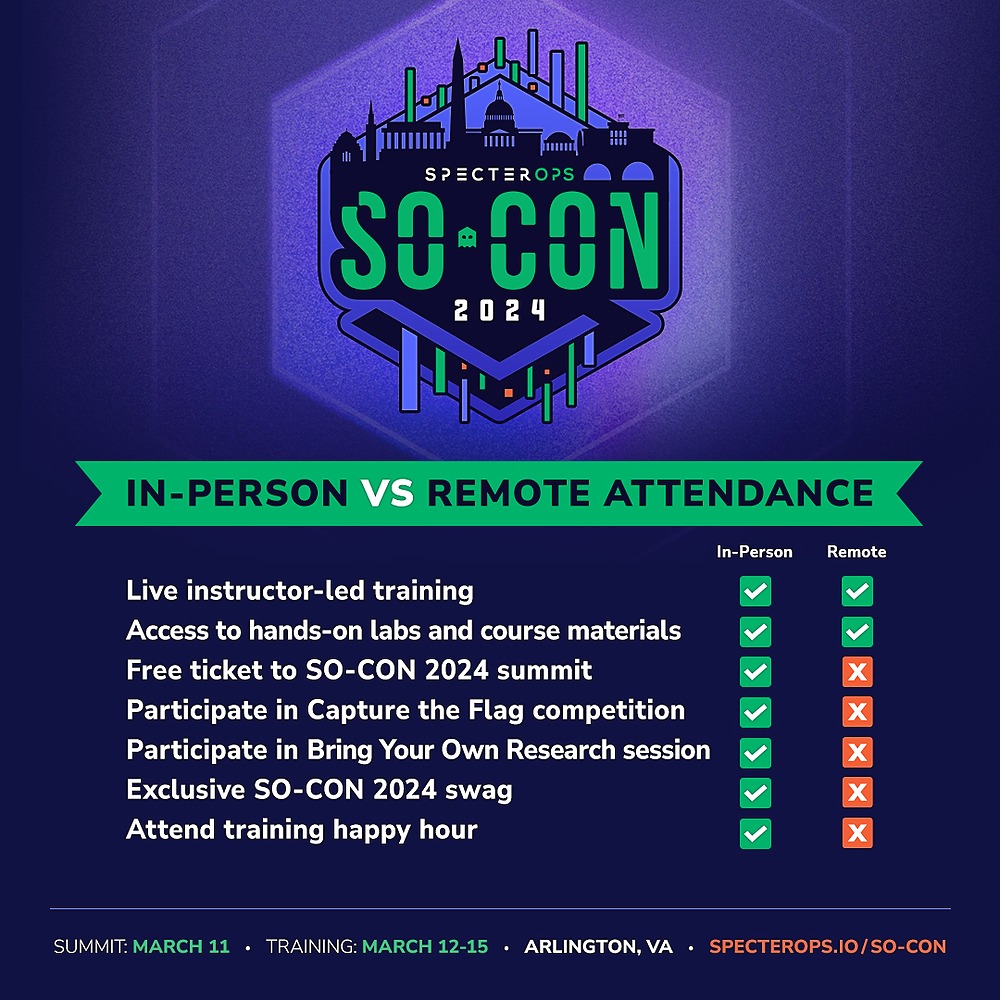Adversary Tactics: Detection - SO-CON 2024 (In-person & Virtual; US Time)
Event description
You bought all the latest detection tools, but somehow still can't seem to detect mimikatz. IT is screaming about the resource consumption from the multitude of security tools on the endpoints, analysts are barely staying afloat in the oceans of data your toolsets have created, and the latest red team report detailed how response actions were ineffective again. If this sounds familiar for your organization, this is the course for you. We'll walk you through starting with a detection engineering strategy first and then focusing on methodologies to build robust alerting, with the end result of improving detection and response capabilities throughout security operations. This course will provide you the understanding and ability to build robust detections, starting with the why and going all the way to the technical implementation of detecting threat actor activity. You will learn how to apply the methodologies and technical approaches practiced, regardless of the security toolsets deployed in your organization.
In this course, you will:
- Learn how to best integrate different components of a detection program for maximum effect
- Integrate "threat hunting" activity into current detection programs to drive meaningful detection engineering
- Understand different threat hunting campaign approaches
- Perform data sensor and data source analysis
- Understand various MITRE TTPs and Threat Intelligence
- Practice standardized processes for developing technical detections
- Document detection research into standardized formats for use in security operations
- In technical labs, practice data aggregation & analysis at scale to detect threat actor activity
Course Summary
Enterprise networks are under constant attack from adversaries of all skill levels and intentions. For many it feels that blue teamers are only facing a losing battle. The attacker "only needs to be successful once" to cause havoc; the blue team must prevent them every time, under every condition, at every step of the way. The goal of this course is to turn that statement on its head and provide you confidence through a new defensive mindset. Preventative solutions are designed to stop attacks before they start, but against an adversary with enough time and resources; all eventually will fail. Rather than making the primary effort of security operations attempting to prevent any attack from being successful, assume breaches could (and likely would) occur and focus on developing robust detections around activity in all stages of the attack cycle. A strategy that focuses on deep understanding of post-exploitation activity (privilege escalation, lateral spread, pivot, persistence) produces high-quality alerts, creating a minefield where the attacker "only needs to be detected once" for blue teamers to respond.
This course builds on standard network defense and incident response (which often focuses on alerting for known malware signatures) by focusing on abnormal behaviors and the use of adversary Tactics, Techniques, and Procedures (TTPs). We will teach you how to engineer detections based on attacker TTPs to perform threat hunting operations and detect attacker activity. In addition, you will learn use utilize free and/or open source data collection and analysis tools (such as Sysmon, Windows Event Logs, and ELK) to analyze large amounts of host information and build detections for malicious activity. You will use the techniques and toolsets you learn to create threat hunting hypotheses and build robust detections in a simulated enterprise network undergoing active compromise from various types of threat actors.
Course Syllabus
Day 1:
- Threat Hunting Introduction
- MITRE ATT&CK and Adversary TTPs
- Data Source Identification
- Data Quality Assessment
- Host Baselining
- Threat Hunting Campaign Types
Day 2:
- Interpreting Threat Reports
- Host-based Collection Methodology
- Defensive Indicator Design
- Hunt Hypothesis Generation Process
- Post Hunt Activities
Day 3:
- Digital Signature Validation
- Dynamic Binary Analysis
- Hunt Hypothesis Generation
- Hypothesis Execution
Day 4:
- Capstone
- Threat Hunting Engagement
- Live Environment/Adversary
SOCON Training Benefits
This course is a part of the SO-CON 2024 event. Attend the SO-CON 2024 conference for FREE by adding the SO-CON 2024 ticket to your training order!

Capture the Flag Challenge
You up for a challenge? Bring your A-game as you solve complex puzzles, exploit vulnerabilities, and race against the clock to capture flags. Prepare to hack the planet through a narrative-driven series of challenges designed to test your cybersecurity expertise.
Join this immersive and educational exercise for FREE as a SO-CON conference or training participant!
Full details, prizes, and registration will be shared soon.
Bring Your Own Research Session
Do you have some research or an innovative infosec concept you're excited to share? Or maybe there's that idea you're itching to discuss with folks?
As an in-person SO-CON training attendee, you are invited to participate in our "Bring Your Own Research" session. Here you'll have the opportunity to present, discuss, and exchange ideas about your research or concept with a gathering of Specters and fellow training participants. Is there a better way to spend an evening than with a blend of constructive feedback and fun conversations?
Full details and sign-ups forthcoming!
Participant Requirements
This class is intended for defenders wanting to learn how to effectively Hunt in enterprise networks. Participants should have previous network defense/incident response experience and/or knowledge of offensive tools and techniques, primarily post-exploitation techniques. Additionally, familiarity with using a SIEM, such as ELK or Splunk, will be helpful.
Hybrid (Virtual) Attendance
If traveling to Arlington, VA isn't feasible, you can opt to take this course virtually online through Zoom. You will receive the same training portal access and watch the live instruction. However, the virtual training is not part of SO-CON - remote attendees will NOT receive any of the exclusive benefits that come with in-person training, including a free ticket to the SO-CON summit, exclusive SO-CON swag, access to the capture the flag challenge, or a chance to participate in the Bring Your Own Research session.
Remote attendees will receive logistics emails and credentials the week before the trainings.

FAQs
How can I contact the organizer with any questions?
Please email training@specterops.io with any questions.
What's the refund policy?
Full refunds will be provided up to 7 days before the course start date.
What are the hardware requirements for attending the course?
Courses are based in the SpecterOps training portal and accessible via an internet connection; no VMs are required for labs. The following are recommended hardware requirements:
- Internet Connection
- 8GBs of RAM
- Modern Web Browser capable of rendering HTML5
Tickets for good, not greed Humanitix dedicates 100% of profits from booking fees to charity



